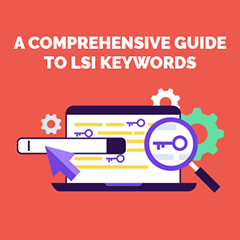 Having your site rank on Google’s first search engine results page (SERP) is a major SEO feat, but it doesn’t come easy.
Having your site rank on Google’s first search engine results page (SERP) is a major SEO feat, but it doesn’t come easy.
There are 30 trillion web pages in Google’s index and only ten spots on Google’s first page. The fight to capture the 91.5% of traffic that goes to the top ten is fierce.
With competition rife, SEOs constantly pursue ways to get ahead, and so far, one of the most recent trends is LSI keywords.
So what are LSI keywords? How can you use them for SEO success? And why have they become such a craze in the SEO community? This article answers your questions.
Let’s jump in.
What is Latent Semantic Indexing?
Latent Semantic Indexing (LSI), also known as Latent Semantic Analysis, is a technology that helps computer programs find the relationship between different words.
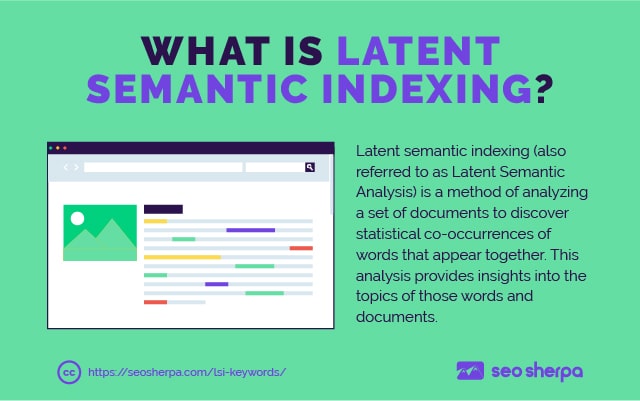
For human beings, deriving the meaning of a word based on its context is simple. If someone mentions the word restaurant, words like ****, menu, champaign, or even diet can easily pop up in your mind because they all fit in the context of a restaurant.
When it comes to computers, however, some “training” is necessary to help them understand that although words are different in meaning, they can be relevant to each other depending on the existing context.
This “training” is what we refer to as Latent Semantic Indexing.
With the help of Natural Language Processing (NLP), LSI helps computers understand languages the way a human being would. In theory, for SEO, LSI helps search engines identify the links between words used on your page.
The assumption is that if the search engine can find many contextually-related terms on your page, it will consider the page more relevant for broader search intent.
What are LSI Keywords?
LSI Keywords are a set of terms connected by their context.
These are the words that LSI technology tries to identify on our page. LSI keywords can be synonymous with each other, but they don’t have to be. They can also be individual words or phrases as long as they make sense when used in a similar context.
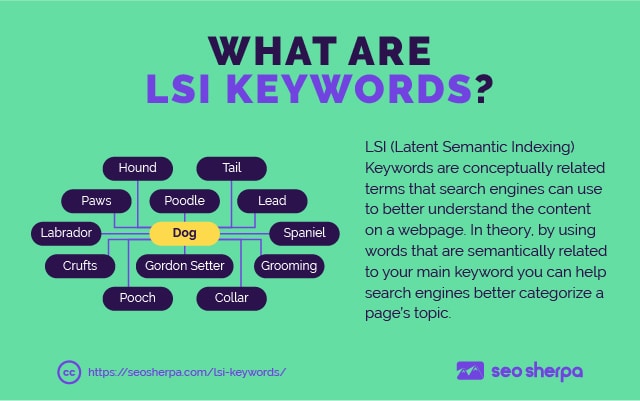
For instance, “cinema” is synonymous with a movie theater. Both words are LSI keywords for words and phrases like “popcorn, tickets, or front-row seats” because they are all words you would use at some point when talking about the cinema.
Does Google Use LSI?
There is a lot of controversy surrounding Google’s application of LSI keywords in their page ranking algorithm.
On the one hand, Google representatives like John Mueller have repeatedly said, “There’s no such thing as LSI keywords.” However, the search engine shows multiple instances of using related terms to suggest relevant content for its users. So, where does Google stand as far as LSI is concerned?
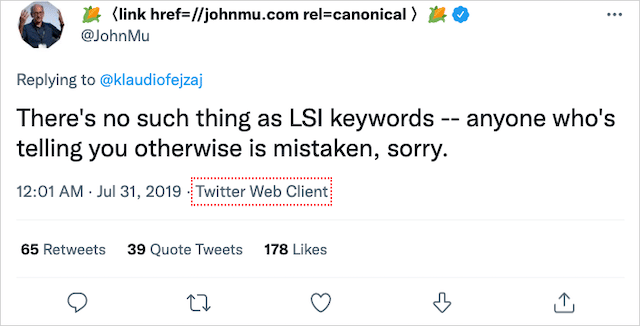
Google has never explicitly declared LSI keywords as a ranking factor. The closest thing resembling LSI keywords that Google launched is the Hummingbird update.
In 2013, Google radically overhauled its algorithm with an update termed Hummingbird. Formerly Google matched keywords in a query to keywords on a webpage. With the Hummingbird update, Google could match a document to a query – even if the keywords were not present.
In short, the algorithm rewrite enabled Google to form better connections between words and understand the topic inherent in the search query.
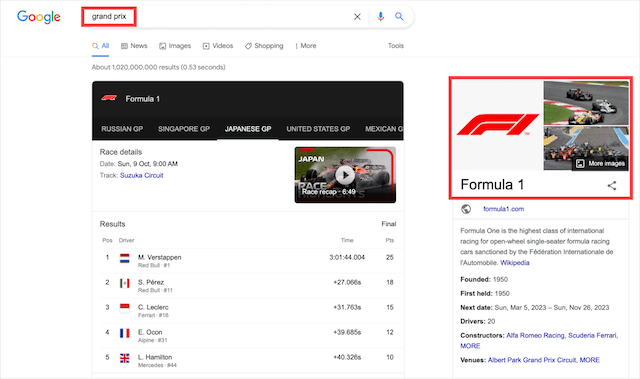
But don’t assume that means Google is using LSI keywords. In reality, Google likely uses a more refined method of understanding the relevance of a page: an approach that considers much more than what related words are present in the document.
Why Are LSI Keywords Important?
Webpages rank highly on Google if they have relevant content for a user’s search intent.
Therefore, top-ranking pages will likely have many natural occurrences of synonyms and semantically related phrases. In other words, numerous latent semantic indexing (LSI) keywords.
You should include appropriate LSI keywords in your content to support better search engine performance for three reasons:
1). LSI Keywords Increase the Scope of Your Content
LSI keywords are a great way to increase the depth of your content. An increased content scope means your page becomes more relevant for multiple search queries.
Let’s break that down a bit:
Assume you have a page about dogs. Instead of having all your content focused on breeds, you can incorporate sub-topics like competitions, equipment, anatomy, and care.
Doing so paves the way to adding LSI keywords like Crufts, collar, lead, paw, tail, and grooming and increases the extent of your content.
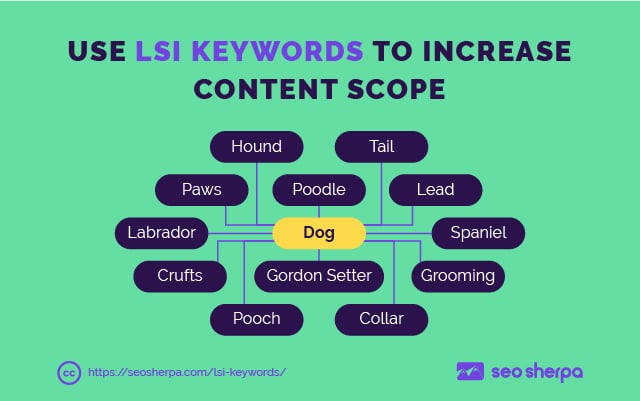
And in turn, you can rank for more keyword phrases.
2). LSI Keywords Attract More Users to Your Page
LSI keywords attract more people to your page.
When your web page explores multiple content ideas and isn’t limited to one narrative, it becomes more appealing to more people.
Take this SEO Sherpa blog post about Header Tags.
The post is over 6,000 words and incorporates multiple sub-topics like H2 tags, H3 tags, heading tag definition, and many more LSI keywords.
Because of that, the page doesn’t only draw users searching header tags but also all of these keywords:
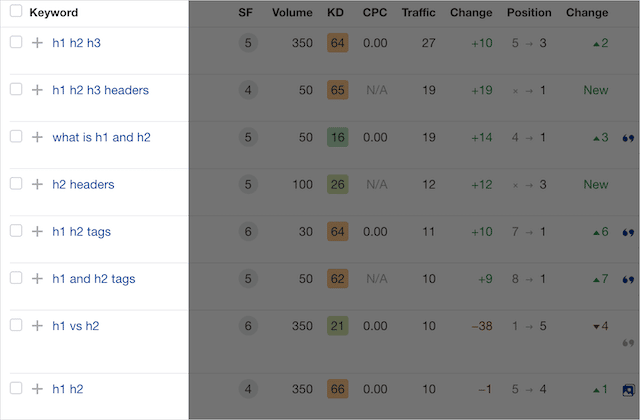
The result is that we get much more organic traffic coming our way.
3). LSI Keywords Boost Your Ranking
Although there’s a lot you need to do to get a high page rank on Google, LSI keywords should be a key consideration in your strategy.
Applying keywords and phrases correctly makes your site more relevant to its core topic, thereby triggering search engines to rank it higher.
How to Find the Right LSI Keywords for Your Website or Blog Post
To reap the benefits of using contextually related terms on your blog or website, you need to know how to find LSI keywords. This can be a challenge for many site owners, so here are my top tips to help you find your way around LSI keywords.
LSI Research and Planning
Like with every other SEO initiative, the journey of finding the right LSI keywords begins with proper planning and research.
Simply placing related terms on your page is not enough to get the relevance that Google demands for a high ranking.
Instead, you need to learn how to divide your content into topics, find LSI keywords for those topics, and prioritize them based on the number of people searching for each keyword.
Here’s a breakdown of how to achieve each of these steps.
How to Group Content into Different Topics and Types of SEO Content
A common mistake people make when identifying LSI keywords is going right into searching for the terms. This is wrong because LSI keywords have to be matched to a particular context to be effective. So, before you scan the internet for keywords, you need to set the context.
The context for LSI keywords comes from the SEO content you intend to use. Let’s analyze some of the most common types of SEO content.
- Evergreen or Pillar Content: This is the kind of content that does not lose its relevance over time, like a website homepage.
- Short-form Content: This is content under 1500 words. It is excellent for short LSI keywords.
- Long-form Content: Anything above 1500 words qualifies as long-form content, which is excellent for long-tail LSI keywords and phrases.
- Series Posts: This is content written in bits and pieces. It is often used to break down long-form content into passages of related topics. Series posts are great for boosting site authority on a particular subject and spreading out a variety of LSI keywords across content pages that share the same core topic.
Identifying the type of SEO content you want helps you organize your content into topic clusters.
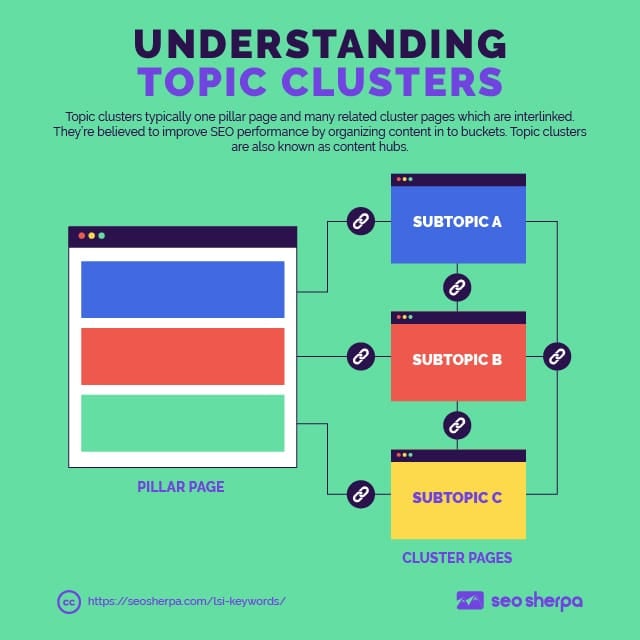
Assume you’re looking to rank well for link-building-related terms.
You would write a pillar post about link-building as the hub, with separate long-form blogs about link-building-related topics as the spokes. These topics could be:
- Guest post link building
- Broken link building
- Email outreach
- Digital PR
- Skyscraper link building
You would then use internal links between these pages in the cluster.
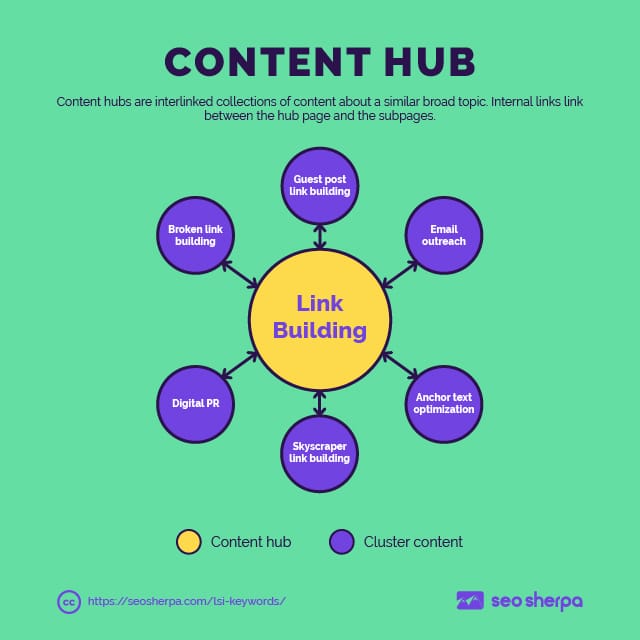
Doing so increases your site’s topical relevancy and makes it easier to select the right LSI keywords for each post.
Identifying LSI Keywords that Suit Each Topic
With your topic clusters all figured out, you need to identify LSI keywords for each. At this point, you want to get as many relevant words as possible for the topic in question.
But how do you know they are relevant?
A rule of thumb is that if the keyword you are about to choose would make you click on a page that pops up when you search for your topic, it is most likely relevant.
If the rule still doesn’t help you figure out the best LSI keywords, then use your knowledge of user intent.
In SEO, the assumption is that every time users search for something online, they have an intention or end goal. Here’s a summary of user intent.
- Finding Information: This happens for users who don’t know something general and want to know it or for users who have a general idea and want to know more.
- Navigation: It applies to users who want specific information, often about a challenge they are experiencing or suggestions for something they need.
- Transaction: This is for users who want to take action and are ready to purchase.
- Commercial investigation: This occurs when users search for specific products that can potentially be purchased in the future.
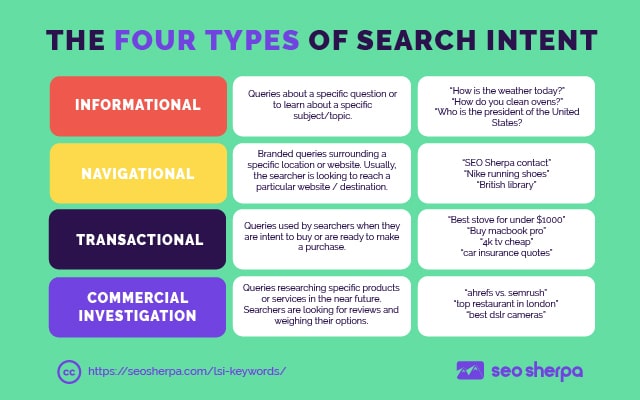
Now, what type of user intent does your main topic serve? Does your selected LSI keyword help to achieve this intent? If it does, it is relevant.
Prioritizing Certain LSI Keywords Based on Search Volume
When you’re done identifying keywords, you will have a long list of relevant words and phrases. However, these phrases don’t have equal search volume.
Search volume is a metric that tells you how many times people search for a phrase over a specified period, say one month.
I recommend Ahrefs Keyword Explorer for identifying search volume. It has a more extensive keyword database than Semrush and Moz and provides more accurate search volumes than Google Keyword Planner.
To check the search volumes of your potential LSI keywords, simply plug the list into Keyword Explorer:
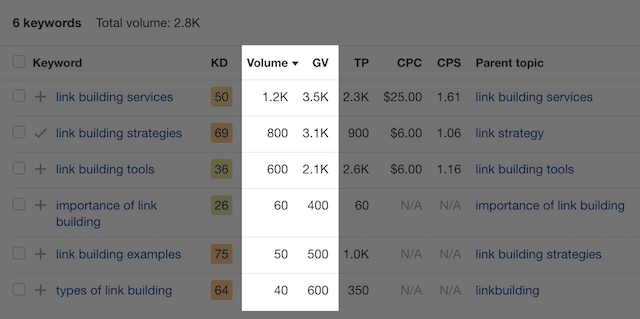
You’ll then see the local search volume (Volume) and global search volume (GV) for your shortlisted keywords and can prioritize your LSI keywords accordingly.
LSI Keyword Execution: How to Implement Related Terms in Your Content
When satisfied with your keyword research and planning process, executing your LSI keywords is next. LSI keyword execution helps you determine how to use your newly identified words and phrases.
Let’s walk you through how this works.
Knowing where to use LSI keywords makes all the difference for your blog or website. You have to be strategic about where you place these words for them to have the desired effect. Here are several places where you can use LSI keywords depending on the type of SEO content you have.
Headings:
The main heading for any content should be the topic, but subsequent headings should strive to use a keyword related to the one in the main topic. For example, an H1 about the best gaming consoles could have an H2 about what to consider when buying video gaming equipment.
Alt-texts:
Alt texts are the descriptive texts accompanying your website or blog images. Using LSI keywords on alt-texts is a genius way of making your content more relevant and improving your image SEO.
Meta Descriptions:
A meta description is a synopsis or summary of what your blog or site is about. This is the text you see under the hyperlinked heading on a SERP. Placing LSI keywords in the meta description draws the reader to your content because it appears more relevant to their search intent.
FAQs:
Your website’s frequently asked questions section is an excellent place for LSI keywords. This section often predetermines how people will frame questions on Google, so having a variety of LSI keywords here can make your content appear for multiple searches.
Anchor texts:
Anchor texts are the words in your content that have embedded links. Using LSI keywords in anchor texts increases the likelihood of the search engine finding relevant content as it searches for links on your page.
Where Should You Avoid Using LSI Keywords?
LSI keywords can go in any section of your content. However, you should avoid using them at any point where they affect the flow of content.

If your LSI keyword feels like fluff in your content or makes your sentence structures sound unnatural, you need to avoid using it.
Tools and Resources You Can Use To Find LSI Keywords
Finding LSI keywords can be challenging, but knowing where to get them is easy. Interestingly, Google is an excellent resource for LSI keywords, but it’s not the only option.
Here’s a detailed list of tools to use to find LSI Keywords:
Free LSI Keyword Finder Tools
Among the best free LSI keyword finder tools is Google. Since the search engine also relies on contextual relevance to display results, this is the first place you should go hunting for your alternative words and phrases.
Some of Google’s features that can help you in your quest:
Google Autocomplete Feature
Google’s Autocomplete feature is what predicts your search query every time you type in the Google search bar. This feature is a fantastic resource for various search terms.
Find the topics you identified when doing your LSI research and planning to make the most of the autocomplete feature.
Type these topics on the search bar and review the predictive suggestions, noting all the relevant keyword variations.
For example, I recently posted about “How You Can Create an XML Sitemap.”
To optimize that post, I typed “XML sitemap” into Google and observed the words Google suggested:
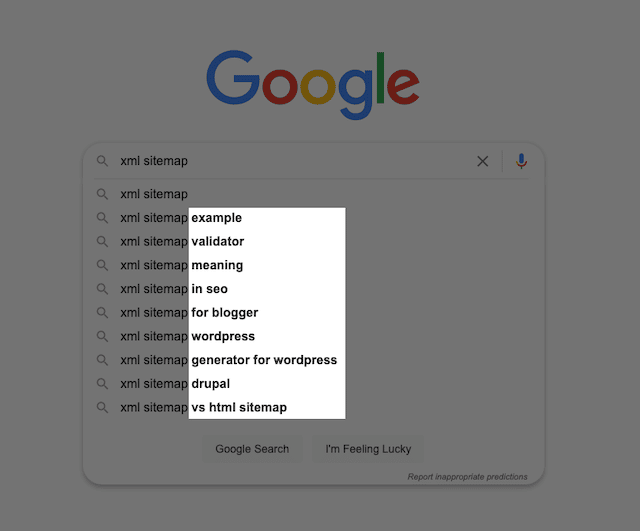
This will uncover even more LSI keywords.
Google Keyword Tool – Keyword Planner:
The Google keyword planner is a feature in Google Ads, formerly AdWords. This planner helps you find the best keywords and determine their search volume.
The keyword planner was designed to help search engine advertisers know which keywords they can use to have higher-ranking ads at a lower price.
But, as long as you have a Google Ads account, you can use the keyword planner to meet your LSI keyword needs.
To find LSI keywords using Google Keyword Planner, plug a seed keyword into the “Discover New Keywords’ tool, and hit Get Results.’
Then, notice what keywords pop up.
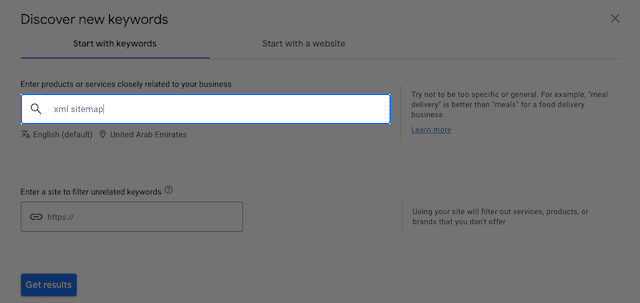
As you can see above, Google suggests a range of related keywords.
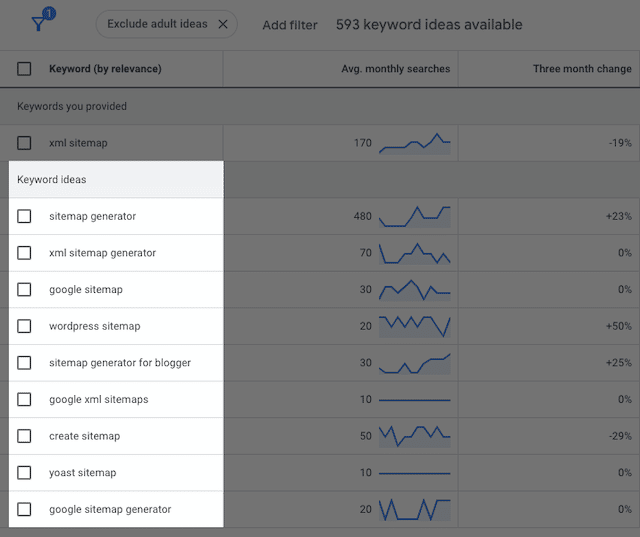
Simply note the relevant terms and sprinkle them into your content as LSI keywords.
Google Image Tag Suggestions
Google has a search results page for images. You can search for a particular topic and view the results in images instead of the usual site-related result page.
This image result page is a goldmine for LSI keyword suggestions.
All you need to do is click on an image and let it load on the right-hand panel that opens.
Now scroll down that panel to see a list of related search image terms and borrow as many relevant terms as possible.
I gave it a try, using “” as my seed keyword, and these are the related searches that popped up:
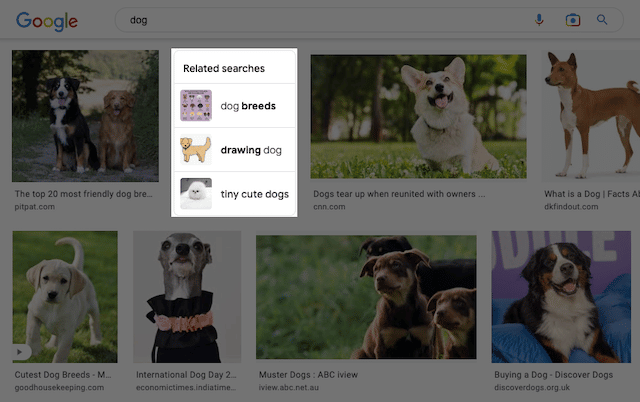
Give it a go with your topic.
Premium LSI Keyword Finder Tools
Free LSI keyword finder tools are great, but they lack the flexibility of premium ones. With premium LSI tools, you can reduce the time spent searching for words because the tool does the hard work for you.
You also get other perks, like tailor-made suggestions for your website, advice on how popular the term is, and how frequently to use it.
Here are some premium LSI keyword finder tools to try out.
Semrush
Semrush is a popular suite of SEO tools.
Of all its tools, those I use most are for keyword research and competitor analysis, which makes Semrush great for finding LSI keywords.
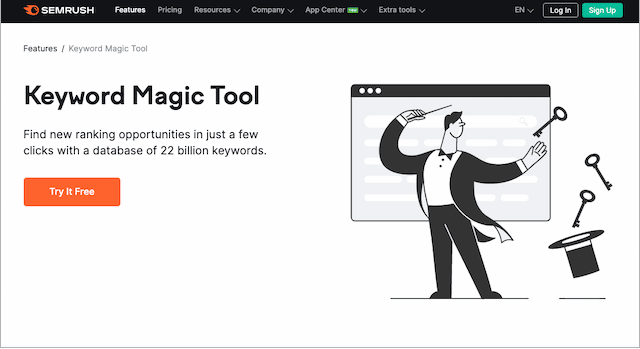
The site offers three plans depending on the scale of your needs. Here’s what each plan costs and the benefits you get from it.
- Pro– Costs $119.95 per month. It is excellent for beginners and small teams: The pro plan allows you to run five SEO projects, track 500 keywords, and get 10,000 results per report.
- Guru– Costs $229.95 per month. You can get this plan if you run an SEO agency or mid-size business. The plan lets you run 15 projects, track 1,500 keywords, and receive 30,000 results for each report.
- Business– Costs $449.95 per month. The business plan is best for large agencies and enterprises: It supports 40 projects, tracks 5,000 keywords, and generates 50,000 results per report.
To find semantically related words using Semrush, head to the Keyword Magic Tool.
Next, enter your main keyword, and you will be shown a list of keyword ideas.
Then click the ‘related’ tab at the top of your screen to see a list of keywords similar to the seed keyword you entered into the tool.
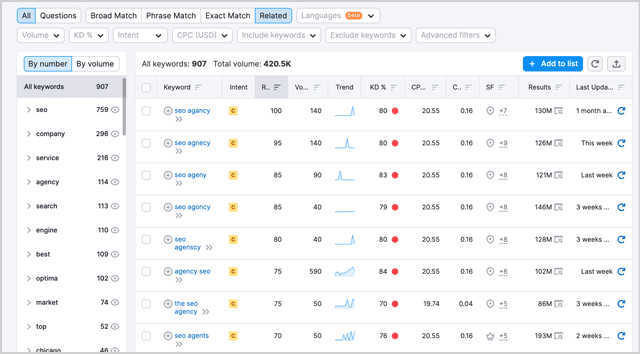
Voila! A list of LSI keywords you can use.
LSI Graph
LSI Graph is a site dedicated to helping you find the right LSI keywords for your content. This site is a great keyword finder tool with multiple features for researching, optimizing, and tuning your content.

Here are the costs and benefits of a premium LSI Graph account.
- Basic– Lifetime cost of $449. This subscription gets you unlimited keyword searches and 25,000 returned keywords per month.
- Premium– Lifetime fee of $699. The premium plan comes with unlimited keyword searches, 10,000 bulk keyword research, and 50,000 keywords returned monthly.
- Agency– Costs $699 for a lifetime membership, but you can only pay using a company credit card. This plan offers unlimited keyword searches and 30,000 bulk keyword research.
It’s worth noting, however, that the prices mentioned are discounted. So, keep an eye out for an increase in cost.
Like Semrush, all you need to do is pop your primary keyword into the tool and hit ‘generate.’
Here are the LSI keywords it spat out when I researched related keywords for this post.
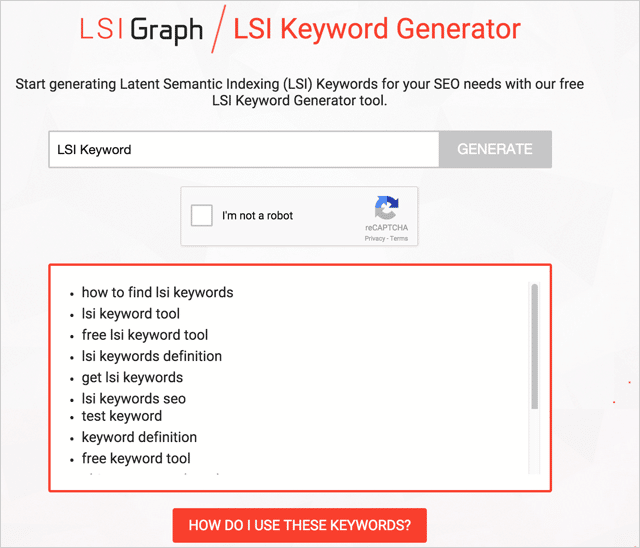
Also Asked
The website alsoasked.com scrapes Google’s ‘People Also Ask’ results in SERPs to generate geo-specific related questions.
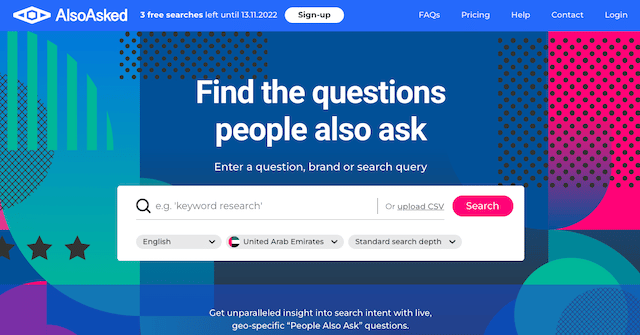
The tool is a goldmine for related search queries, and its results are visually appealing:

The website has limited free searches, meaning you’ll need a paid plan for LSI keyword research at scale. Also, Asked offers three:
- Basic – Costs $15 per month and offers 100 searches monthly.
- Lite – Costs $29 per month and offers 300 searches monthly.
- Pro – $59 per month and offers 1000 searches monthly and API access.
Are There Any Potential Downsides to Using LSI Keywords in Your SEO Strategy?
LSI keywords don’t necessarily have any downsides.
However, misusing them can lead to a lower page rank. This means you should plan the use of LSI keywords, only use them where they feel natural, and avoid stuffing them in your content.
FAQs
What is LSI in SEO?
LSI in SEO refers to Latent Semantic Indexing, a technology that identifies words with similar contexts.
For example, the word ice cream shares the same context as words like calories, summer, and flavors. Even though these words don’t mean the same thing, they make sense when used in the context of ice cream, so LSI is used to identify them in a piece of content.
Are LSI Keywords the Same as Synonyms?
LSI keywords are not synonyms. They can be synonyms, but they do not have to be. The only requirement for words to qualify as LSI keywords is to make sense when used in a similar context.
What Happens When I Don’t Use LSI Keywords in My SEO Strategy?
There is no penalty by Google for not using LSI keywords in your SEO strategy. However, you may struggle to make your content diverse and improve your page rank when you fail to use LSI keywords.
Final Thoughts
LSI keywords should be referred to as “related keywords” since Google almost certainly doesn’t use latent semantic indexing in the true sense of the word.
Using semantically-related words and phrases where they fit naturally is an excellent idea. They can help you increase your page relevancy and grow the number of keywords you rank for.
Simply find “LSI keywords” using the steps in this post, sprinkle them into your content – or add a new section(s) if necessary – and you are good to go.
Do you have any LSI keyword questions?
Post your question in the comments below.
